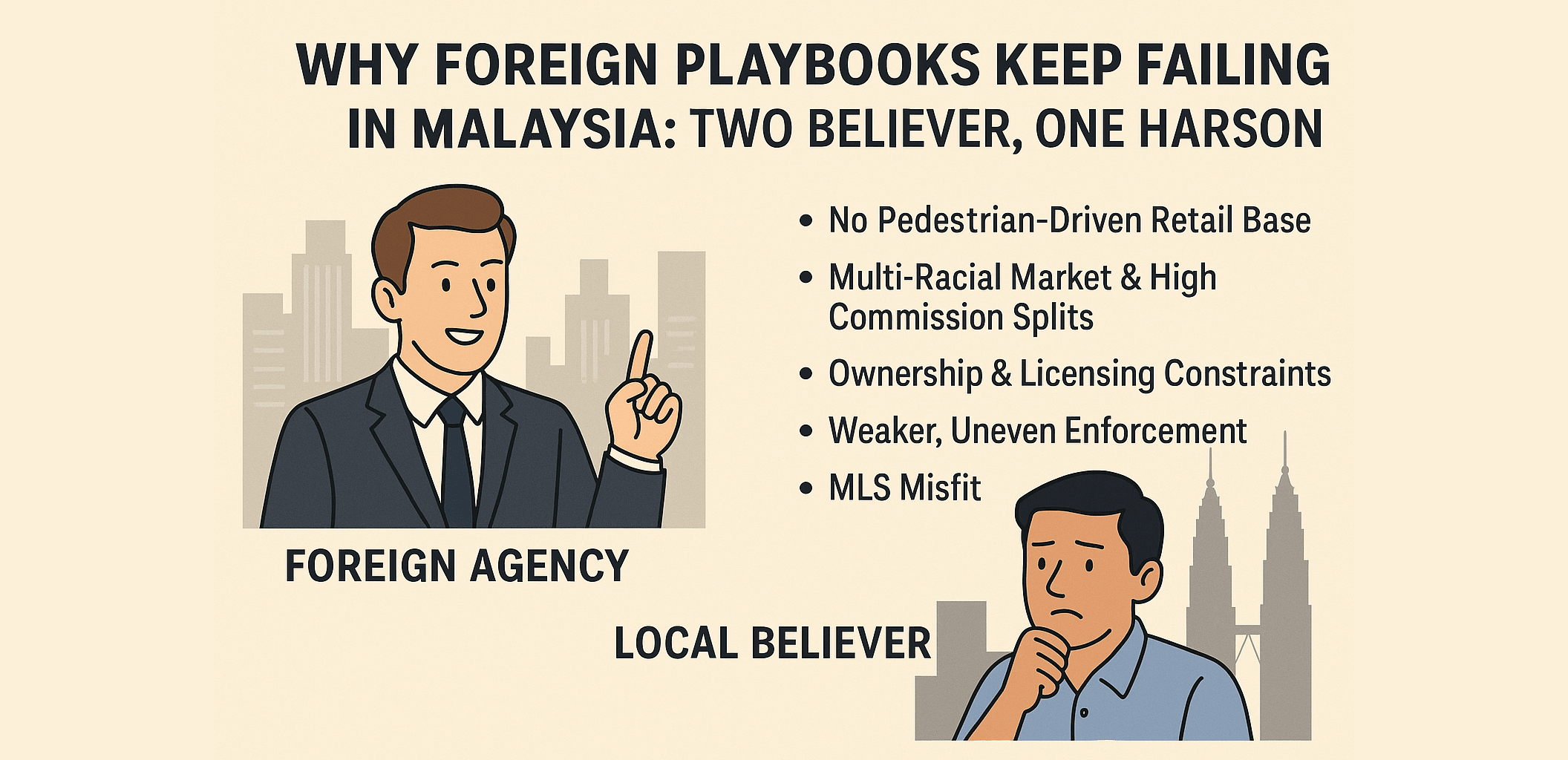Why Foreign Playbooks Keep Failing in Malaysia: Two Believers, One Hard Lesson

Across the years, two groups have tried to “upgrade” Malaysia’s real estate market by importing overseas playbooks. The first are foreign agencies, confident their formula—proven in London, Sydney, Hong Kong, or the U.S.—will modernise Malaysia overnight. The second are local champions who idolise these models and believe they can be transplanted with minor tweaks. Both start with conviction. Both hit the same wall.
The Confident Foreign Entrant
Foreign groups often arrive assuming Malaysia is simply their home market “30 years earlier.” They plan to monetise local buyers, sellers, landlords, and tenants with familiar tactics: high-street shopfronts, walk-in pipelines, strict process control, and heavy brand premiums. On paper, it’s a copy-paste. In practice, the ground won’t take the seed.
The Enthusiastic Local Transplanter
Then come the locals who love the foreign playbook even more than the foreigners. They adopt the lingo, replicate the org chart, and try to enforce the same discipline. A while ago, some even attempted to roll out a U.S.-style MLS. They grasped the surface mechanics but not the full institutional setup—especially the culture of exclusivity and enforceable cooperation. In Malaysia, exclusive appointments are much harder to secure and sustain, so the MLS incentives never took root. The tool arrived; the ecosystem didn’t.
Same Collision, Different Drivers
Despite their different vantage points, both groups crash into the same five structural realities:
1) No true pedestrian-driven retail base (climate + footfall).
Weekday mall traffic is inconsistent, and the weather is hot or rainy. High-street shopfront models that depend on passersby don’t scale. Malaysians default to cars and digital discovery, not window shopping for property.
2) A multi-racial market with distinct trust networks and behaviours.
Assuming that meeting a few local Chinese clients equals “understanding Malaysia” is a classic error. Preferences, negotiation styles, and marketing channels vary by community; segmentation is deeper than many realise.
3) The commission-split reality.
Splits in Malaysia are already very high. Trying to skim “brand” or “loyalty” tax on top sends agents to higher-payout competitors. Retention is earned through daily value—leads, systems, training, ops—not abstract branding promises.
4) Ownership and licensing constraints.
Controlling ownership must sit with Registered Estate Agents. Foreign parents cannot simply majority-own and steer the agency. Without qualified local principals and compliant structures, governance and decision-making jam at the licensing layer.
5) Uneven enforcement in the agency ecosystem.
Regulation exists, but enforcement is inconsistent. Illegal operators coexist with licensed firms, warping consumer expectations and price discipline. Models that rely on a tightly policed playing field struggle to function as designed.
Culture Shock in Operations
Put together, these factors create operational culture shock. The soil here is different: distribution, trust, compliance, and incentive math don’t map 1:1 from overseas markets. Copy-pasting a playbook grows shallow roots—and withers.
The Exceptions (And Why They Work)
A few foreign setups do succeed, but they look and act differently. They’re less cocky, more adaptive, and led day-to-day by locals who actually understand how business gets done here. Critically, they monetise where they hold a genuine edge: serving foreign buyers and MNC occupiers entering Malaysia, not trying to dominate domestic retail overnight. They localise ownership, operations, distribution, and compensation—then let the results compound.
The Takeaway for Both Camps
If you’re foreign: Malaysia is not your home market “with a lag.” Treat it as a distinct ecosystem and empower local leadership to rewrite your playbook.
If you’re local: don’t worship imported models. Borrow what fits, discard what doesn’t, and build around Malaysia’s actual channels, incentives, and laws.
Two believers, one lesson: business models don’t travel on faith. They travel on fit.











































































































